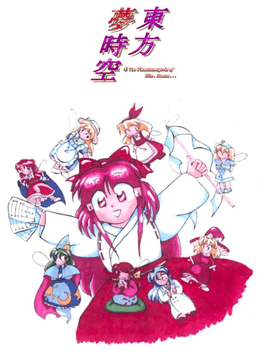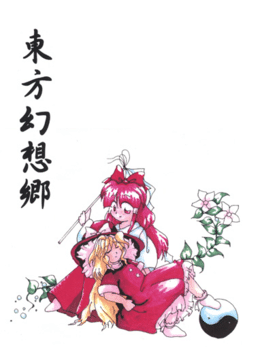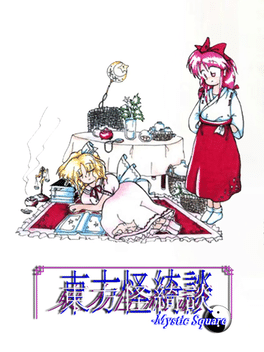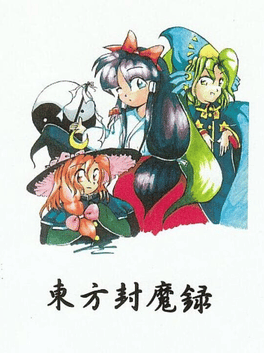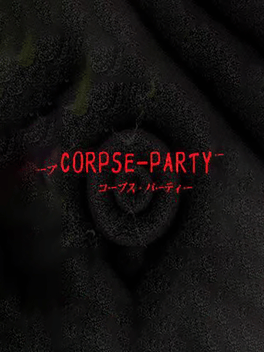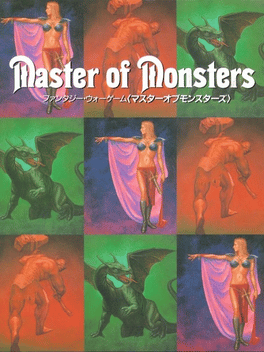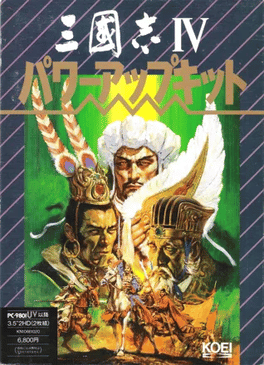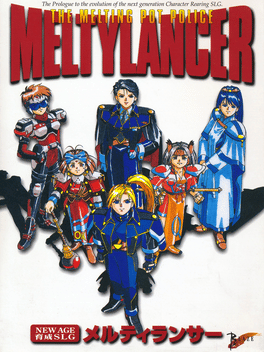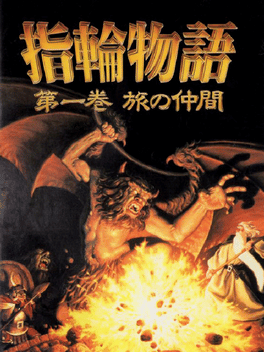Most Popular Pc 9800 Series Games
-
Touhou Rei'iden: The Highly Responsive to Prayers
1996
star 5The game introduces the Shrine Maiden Reimu Hakurei, who frantically attempts to persuade a bouncing Yin-Yang Orb to hit various on-screen targets, "cards" and "bosses" alike. Reimu can knock and maneuver the Yin-Yang orb around by whacking it with her gohei, slide-tackling it, and firing shots at it. Enemies will be trying to hinder your progress by firing at you, but you can cancel out their shots with your own, or even deflect them by swinging your gohei. Only the Yin-Yang orb can damage the enemies, however, so simply firing your shots at enemies will have no effect. As a last resort, Reimu can use a "bomb", once per life, to hit all cards on the screen. There is no guarantee that any given card will be hit, and will often fail to damage a boss. The game consists of several stages of increasing difficulty, with a boss fight occurring every five stages. To complete a stage, the player should clear all cards or defeat the boss. Reimu will lose a life whenever she is hit by an enemy projectile or the yin-yang orb -
Touhou Yumejikuu: Phantasmagoria of Dim. Dream
1997
star 6.8This game is a vertical danmaku shooting game, where two characters engage in danmaku gameplay within individual and separate play areas (aka. split-screen). Upon meeting certain conditions, players are able to unleash a variety of character-specific Spell Attacks upon their opponents in an attempt to whittle down their remaining health points. In Story Mode, the player will face nine opponents, each more capable than the previous. Phantasmagoria of Dim.Dream also features a Match Play Mode where the player may face off against AI opponents or compete against other players, as well as watch AI vs. AI matches. -
Touhou Gensoukyou: Lotus Land Story
1998
star 7.9This game features two playable characters to choose from, with two different attack types each. Reimu Hakurei can pepper a wide area of the screen with weaker attacks, while Marisa Kirisame relies on her power to compensate for her narrower attack spread. The bombs also exhibit unique behavior and damage amounts depending upon the character chosen. Lotus Land Story is the first game in the Touhou Project to feature bombs that auto-collect items, graze counting, the ability to move more slowly by holding the shift key, and a non-trivial scoring system that involves the collection of special dream items that boost the player's ultimate scoring potential. The game's scoring system also marks the series' first instance of score bonuses for the elimination of bullets following the defeat of mid-bosses and bosses. -
Touhou Kaikidan: Mystic Square
1998
star 7.9Mystic Square allows the player to select from among four unique protagonists, each hailing from one of the 2 prior danmaku shooting games in the series. Series mainstays Reimu Hakurei and Marisa Kirisame are joined by former enemies Mima and Yuuka Kazami for a journey reaching to the depths of the Makai. Mystic Square also marks the first appearance of Alice Margatroid as an opponent, who later stages a comeback in Perfect Cherry Blossom. Although limited by the PC-98 hardware, Mystic Square is the most refined of the PC-98 Touhou titles, and features gameplay quite similar to Windows Touhou games. It employs a variant of Lotus Land Story's Dream Bonus system, rewarding the player for taking risks (i.e. collecting point items from the top of the field area). Its rank system, however, is more lenient than Lotus Land Story's. -
Touhou Fuumaroku: The Story of Eastern Wonderland
1997
star 6.9The Story of Eastern Wonderland casts the player as the Shrine Maiden Reimu Hakurei and offers three distinct attack types to choose from: a wide-range type with weak attack power, a mid-range type with moderate attack power and auto-targeting capabilities, and a narrow-range type with high attack power but lowered movement speed. The bombs also exhibit unique behavior depending on the type chosen. As the first danmaku shooting game in the Touhou Project, the Story of Eastern Wonderland introduces many features that are now hallmarks of the series as a whole: relatively small hit boxes, boss characters who are not much larger than the player character however are highly mobile, a power-up system, variable-worth point items, an unlockable Extra Stage, and a semi-complex scoring system. The game also marks the first appearance of Marisa Kirisame, who would become a major character in the series, appearing as often as Reimu Hakurei herself. -
Corpse-Party
1996
Corpse-Party
1996
star 7.6A group of friends unknowingly perform an occult ritual that traps them in an otherworldly elementary school. Here, the vengeful spirits of young children threaten their lives and their sanity, and the only hope of survival is to uncover the chilling details behind the murders of those trapped before them... -
Master of Monsters
1989
Master of Monsters
1989
PC-98 port of "Masters of Monsters". Master of Monsters is a turn-based strategy game in which you choose one of five different wizards and fight the other wizards for domination of the land that stands without a ruler after the master wizard's death. You can play in two campaigns against the computer which requires you to defeat the enemy wizards on all maps and allows you to take all units that have survived a battle into the next one. You can also play all maps individually with up two four human players. In battles, you can summon different monsters and cast spells. Which monsters you can summon and which spells you can use depends on which wizard you have chosen. -
Progenitor
1994
Progenitor
1994
Progenitor is a space adventure/strategy game. You play as Kenny, a space pirate searching for his long-lost father. There are over a dozen explorable planets where you can buy and sell goods and perform tasks. Demand for goods (and their prices) change based on the characteristics of the planet you're on. -
Agalta 3
1995
Agalta 3
1995
The final entry in the JRPG doujin series by Fenrir. The thousand-year old struggle, which began with the Demon King Zozem using the Powers of Chaos against the gods, is nearing its end. Three brave heroes - Ares, Seria, and Georgie - ventured into the World of Spirits to restore balance in the universe. As they continue their journey, a mysterious powerful magician attacks them. They are brought to the house of Dr. K., a local scientist. Seria becomes gravely ill; to save her, Ares and the Doctor go to the nearby forest in search of cure... -
Agalta II
1994
Agalta II
1994
Agalta II picks up right where the first game ended. Ares and his two companions, Seria and Georgie, have defeated the evil and are returning on their airship to the home city of Saladin. Afterwards, they decide to travel on the airship, looking for new adventure. And surely enough, a new adventure begins - but not quite the way they imagined. A storm causes their airship to crash on an unknown continent. The trio of heroes is rescued by the king of Safaya. As a token of gratitude, they decide to help the king defend his land against mysterious monsters that attack it... -
Agalta
1993
Agalta
1993
A fairly traditional Japanese RPG developed by the doujin circle Fenrir with all the familiar ingredients of the JRPG genre, There is, however, a real-time element in the combat, similar to the ATB system of Final Fantasy series. -
Early Kingdom
1992
Early Kingdom
1992
Early Kingdom is an Action RPG, developed by Kure Software Koubou (KSK) for the PC-98 and released in Japan in 1992. -
Jikuu Sasatsukan Hayate: Inspector
1994
In the future, after the latest World War, various nations of the Earth joined forces and built a super-powerful computer knows as "Juno", which would be able to preserve peace and to help scientists in their researches. Every four years, a fighting tournament is held by the company that built the computer. The rules of the tournament are strange: female fighters who lose agree to perform services of sexual nature. The Time and Space Investigation office decides to find out what really happens there, and sends a young employee named Hayate to participate in the tournament... Jikuu Sasatsukan Hayate: Inspector is a one-on-one fighting game. There is an exercise mode, but it only allows to fight one opponent on an easier difficulty level. In the "normal mode", the difficulty is higher, and all the fights are dictated by the story; it's impossible to choose player-controlled fighters, opponents, scenario, etc. Every battle has just one round. The fighters can use various punches and kicks, jump, and execute powerful s -
Hayate the Battle: Hyper Real Battle Action
1994
Hayate the Battle is a fighting game released in Japan for the NEC PC9801. The Game is set in the same universe and features the characters from Jikū Sōsakan: Hayate -
Sword Dancer: Kyoujin no Megami
1994
Goddess of the Evil Blade is a direct sequel to the first Sword Dancer. The story continues to chronicle the adventures of the "sword dancer" Hien and his mentor, the warrior Tetsuta. They have succeeded in rescuing the "white dragon sorceress" Setsuna from the clutches of the demons. However, greater challenges await the three. Setsuna's life might be in danger, and the watchful eye of the evil Black Dragon continues to follow the heroes. The adherents of the benevolent White Dragon have to prepare for the decisive battle against the forces of evil... The game plays very similarly to its predecessor. The overall structure corresponds to that of a traditional Japanese RPG: the player navigates the heroes through top-down environments, buying supplies in town, advancing the narrative in a linear way, and fighting enemies to gain experience and level up automatically. Like in the first game, the battles are action sequences that take place in small side-scrolling areas, similarly to fighting games. However, unlike i -
Meltylancer: The Melting Pot Police
1995
MeltyLancer is a life simulation game similar to -- and by the same designers as -- Graduation, in which the player is tasked with training a squad of six young Tokyo Eastern Metro Police recruits, called Lancers. The main core of the game is determining each Lancer's weekly schedule: which days are they on patrol, which days on standby, and which days do they have off? After the general schedule is determined, the player meets with each Lancer to speak with them directly, determining specific actions they'll take that week; whether they spend a day training, exercising, or getting some much-needed rest will affect their stats and ability to complete missions. While on patrol or on special missions, battles may occur, which can be partially controlled with a handful of commands but mostly play out automatically. Each of the six Lancers has their own abilities, personalities, and specialties. A mini-CD containing the game's theme song is also included in the package. -
Yubiwa Monogatari: Dai-ikkan - Tabi no Nakama
1991
The PC-98 port features different graphics and sound. -
Yubiwa Monogatari: Dai-ni-kan - Futatsu no Tou
1993
PC-98 port features different graphics and sound.

